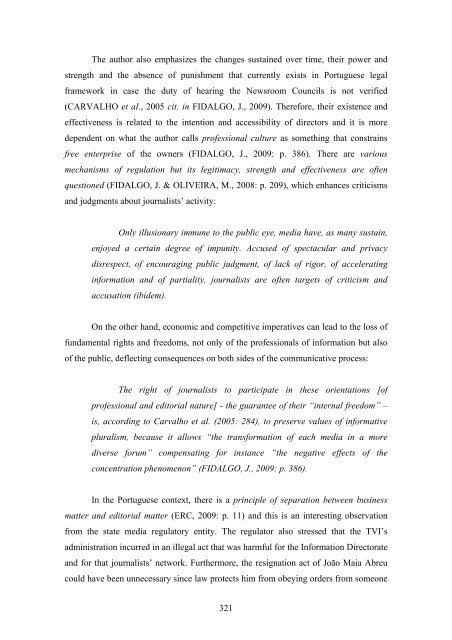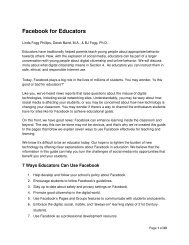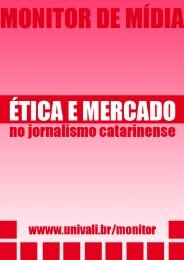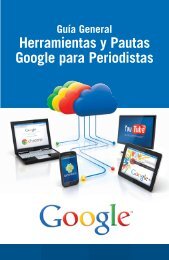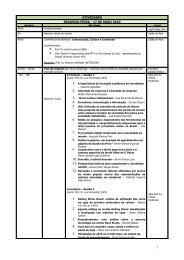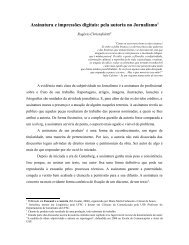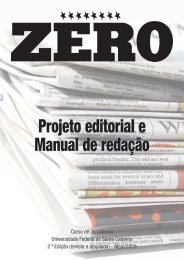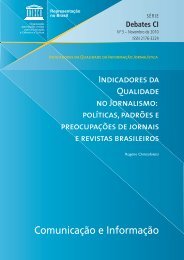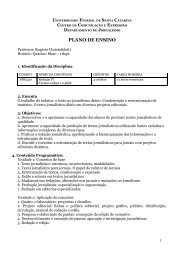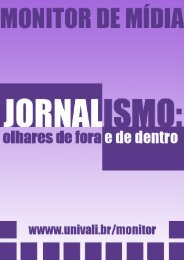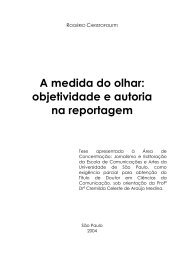- Page 1 and 2:
Ética Periodística a Principios d
- Page 3 and 4:
Saludo de la coordinación. Duros m
- Page 5 and 6:
ÍNDICE CAPÍTULO 1. Discursos etno
- Page 7 and 8:
CAPÍTULO 1. DISCURSOS ETNOCÉNTRIC
- Page 9 and 10:
1. INTRODUCCIÓN “La fotografía
- Page 11 and 12:
Actualmente, la producción de imá
- Page 13 and 14:
determinada visión del mundo (etno
- Page 15 and 16:
Tomando ambos marcos, nuestro model
- Page 17 and 18:
circunstancias que están fuera de
- Page 19 and 20:
eproducción de una determinada int
- Page 21 and 22:
la verosimilitud, la apariencia de
- Page 23 and 24:
tan evidente que lleva a pensar en
- Page 25 and 26:
BAUMAN, Z. (2007) Tiempos líquidos
- Page 29 and 30:
ANEXO 2 Categorización morfosintá
- Page 31 and 32:
Alta / Media / Baja / Nula Entre lo
- Page 33 and 34:
CAPÍTULO 2. LA IMAGEN DE LA DISCAP
- Page 35 and 36:
La mayoría de las asociaciones cue
- Page 37 and 38:
El tratamiento de la información d
- Page 39 and 40:
El Mundo, 18 de marzo de 2010 Down
- Page 41 and 42:
Un cantaor con síndrome de Down gr
- Page 43 and 44:
disfunciones que provoca la dolenci
- Page 45 and 46:
-Olvido. (El Alzheimer es una enfer
- Page 47 and 48:
continuidad a la presencia de las e
- Page 49 and 50:
mensajes públicos. Es entonces cua
- Page 51 and 52:
El reto de cualquier sociedad occid
- Page 53 and 54:
2. COMUNICACIÓN Y MIGRACIÓN 2.1.
- Page 55 and 56:
Sucede con frecuencia que muchos co
- Page 57 and 58:
culturales y, sobre todo, lingüís
- Page 59 and 60:
son los que deciden las reglas de j
- Page 61 and 62:
4. EL PERIODISMO ACTUAL En la socie
- Page 63 and 64:
tratamiento de la información debe
- Page 65 and 66:
Herman, E. 1999. Los medios globale
- Page 67 and 68:
information sources, which is basic
- Page 69 and 70:
¿Cómo se logra una información v
- Page 71 and 72:
d) A comunicar o recibir libremente
- Page 73 and 74:
Es el mismo periodista el que decid
- Page 75 and 76:
El periodista tiene que preservar l
- Page 77 and 78:
Pero en este caso, el derecho a com
- Page 79 and 80:
La ley regulará los casos en que,
- Page 81 and 82:
CAPÍTULO 5. LA DELGADA FRONTERA EN
- Page 83 and 84:
provoca que prevalezcan otros inter
- Page 85 and 86:
protección de la juventud y de la
- Page 87 and 88:
eemplazando la relevancia pública
- Page 89 and 90:
Antena 3 es la cadena de televisió
- Page 91 and 92:
Estos aspectos están fuertemente p
- Page 93 and 94:
SERRA CALLEJO, Javier; PUENTE SEGUR
- Page 95 and 96:
deontología a cualquier profesión
- Page 97 and 98:
Si agrupamos estas responsabilidade
- Page 99 and 100:
Una de las definiciones de Relacion
- Page 101 and 102:
‐ Responsabilidad, siendo conscie
- Page 103 and 104:
la organización y sus públicos y
- Page 105 and 106:
las situaciones en que son afectado
- Page 107 and 108:
“público” en su sentido origin
- Page 109 and 110:
tratando de averiguar en tal diálo
- Page 111 and 112:
COMISIÓN EUROPEA. (2001) Libro Ver
- Page 113 and 114:
Key words: International Cooperatio
- Page 115 and 116:
En el primero de los principios, Hu
- Page 117 and 118:
si pretenden consolidar los código
- Page 119 and 120:
En España, la Confederación de Or
- Page 121 and 122:
labor. La cuestión radica si debe
- Page 123 and 124:
punto o puntos muy específicos ace
- Page 125 and 126:
En el campo de la Cooperación, exi
- Page 127 and 128:
CONGDE en materia de pautas comunic
- Page 129 and 130:
profundo de la realidad, ni se desp
- Page 131 and 132:
CONGED (1998). Código de conducta
- Page 133 and 134:
Keywords: citizenship, civic-ethic,
- Page 135 and 136:
forma más explícita que otros) no
- Page 137 and 138:
al pluralismo moral, es decir, a un
- Page 139 and 140:
clasificación aristotélica de las
- Page 141 and 142:
contribuyendo tales elementos a la
- Page 143 and 144:
tan lejos de la comunidad política
- Page 145 and 146:
establecerse como un principio de l
- Page 147 and 148:
CAPÍTULO 9. ÉTICA, SALUD Y MEDIOS
- Page 149 and 150:
la radio española por ser, precisa
- Page 151 and 152:
colectivos, derechos e intereses. E
- Page 153 and 154:
inmigración. Aunque el abanico de
- Page 155 and 156:
primeros nueve minutos, el drama de
- Page 157 and 158:
mención de las otras dos esquelas
- Page 159 and 160:
“La tarea primordial del periodis
- Page 161 and 162:
c) Las restricciones sobre intromis
- Page 163 and 164:
nuestra cadena pública televisiva:
- Page 165 and 166:
‣ Melvin L. De Fleur y Sandra J.
- Page 167 and 168:
and a media professional must have
- Page 169 and 170:
Una vez documentada, me encontraba
- Page 171 and 172:
Es claro establecer que estas liber
- Page 173 and 174:
Sin embargo, esta visión que se ac
- Page 175 and 176:
Actualmente la persona-vida privada
- Page 177 and 178:
tal caso, el profesional de la info
- Page 179 and 180:
- La relevación pública de datos
- Page 181 and 182:
8. CONCLUSIÓN. Actualmente, el der
- Page 183 and 184:
CAPÍTULO 11. LA INFORMACIÓN Y LA
- Page 185 and 186:
aunque hablemos de distintos tipos
- Page 187 and 188:
Por lo tanto, podemos deducir que l
- Page 189 and 190:
Por lo que en resumen, la gran dife
- Page 191 and 192:
dependencia. Con liberal quiero dec
- Page 193 and 194:
usca, investiga, contrasta y trabaj
- Page 195 and 196:
pregunto ¿cómo es esto posible?,
- Page 197 and 198:
La responsabilidad desde esa perspe
- Page 199 and 200:
DE CARRERAS, L. (2008) Las normas j
- Page 201 and 202:
Rivette: Hay cosas que sólo deben
- Page 203 and 204:
un nombre. Se llama censura. Con Ri
- Page 205 and 206:
sesenta) han venido dadas las actua
- Page 207 and 208:
2.2 El código Dogma: “el voto de
- Page 209 and 210:
“Cine y fotografía forman y form
- Page 211 and 212:
terminilogía de Heidegger. ¿Cómo
- Page 213 and 214:
La teoría de la hiperdiscursividad
- Page 215 and 216:
travelling que se acerca hacia noso
- Page 217 and 218:
LIPOVETSKI, G; SERROY, J. (2007): L
- Page 219 and 220:
CAPÍTULO 13. RESPONSABILIDAD SOCIA
- Page 221 and 222:
Por otra parte, Cajasol también as
- Page 223 and 224:
Pese a todo ello, las empresas debe
- Page 225 and 226:
En conclusión, que las empresas te
- Page 227 and 228:
como instrumento a través del cual
- Page 229 and 230:
irrespetuosas con el entorno natura
- Page 231 and 232:
Los actuales gobiernos corporativos
- Page 233 and 234:
HONG, S. Y.; RIM, H. (2010): “The
- Page 235 and 236:
1. INTRODUCCIÓN I know you believe
- Page 237 and 238:
Empecemos definiendo el objeto de e
- Page 239 and 240:
trasmite. En esta cuestión, desemp
- Page 241 and 242:
entenderse un determinado mensaje.
- Page 243 and 244:
3) Esclarecimiento de los objetivos
- Page 245 and 246:
Sin embargo, y aunque se reconocier
- Page 247 and 248:
local que les permitan obtener noti
- Page 249 and 250:
CARBONELL, O. (2004) “La ética d
- Page 251 and 252:
CAPÍTULO 15. LA LIBERTAD DE EXPRES
- Page 253 and 254:
2. EL DERECHO A LA LIBERTAD DE EXPR
- Page 255 and 256:
Tienen que transcurrir veinte años
- Page 257 and 258:
democráticos vuelven a ser la gara
- Page 259 and 260:
mexicana Contralínea, que según l
- Page 261 and 262:
códigos deontológicos países com
- Page 263 and 264:
Latinoamérica. En este período se
- Page 265 and 266:
periodistas que se autocensuren. O
- Page 267 and 268:
los medios de comunicación y los p
- Page 269 and 270:
PORTAL CUBA. Constitución de la Re
- Page 271 and 272: Meanwhile, using strategic alliance
- Page 273 and 274: PNR. (El Universal, Edición Especi
- Page 275 and 276: El resultado de esta comisión se e
- Page 277 and 278: hijo del presidente, Miguel Alemán
- Page 279 and 280: administrativo), Luis de Llano (sub
- Page 281 and 282: 4.2.1. Canales 8 y 13, comepetencia
- Page 283 and 284: En el acta constitutiva de Televisa
- Page 285 and 286: de nuestro partido haré todo lo po
- Page 287 and 288: como Proyecto 40. El gobierno feder
- Page 289 and 290: Entre los puntos relacionados al fi
- Page 291 and 292: unión del spot e integración tien
- Page 293 and 294: MEJIA, F. (1998) Historia mínima d
- Page 295 and 296: CAPÍTULO 17. EL REFLEJO DE LAS DIS
- Page 297 and 298: potencial militar) y la II Guerra M
- Page 299 and 300: 3. MANIPULACIÓN Y PROPAGANDA. 3.1.
- Page 301 and 302: así: “Elevándose como el Gran O
- Page 303 and 304: Hoy, no existe riesgo real de rebel
- Page 305 and 306: del comunismo soviético o el nazis
- Page 307 and 308: 2.5.3. La mutabilidad histórica La
- Page 309 and 310: estas misiones de paz? ¿Han impues
- Page 311 and 312: comercios, en centros de ocio, en l
- Page 313 and 314: CAPÍTULO 18. EL POLÉMICO FINAL DE
- Page 315 and 316: Therefore, assessments were made in
- Page 317 and 318: whether for different princes’ in
- Page 319 and 320: Portuguese Journalists’ Syndicate
- Page 321: Taking into account these considera
- Page 325 and 326: of the professional identity of jou
- Page 327 and 328: Journalism and the media benefit wi
- Page 329 and 330: FIDALGO, J. & OLIVEIRA, M. (2008)
- Page 331 and 332: to justify the implementation of pr
- Page 333 and 334: Cuanto más la prensa hablar sobre
- Page 335 and 336: 2.3 Campo periodístico versus Camp
- Page 337 and 338: Las consideraciones referidas dibuj
- Page 339 and 340: Sin embargo, el secreto de sumario,
- Page 341 and 342: 4. El “arguido” es, entonces, n
- Page 343 and 344: econocidos y por su grande cobertur
- Page 345 and 346: poderosos', que acaban por ser cond
- Page 347 and 348: Prensa: DIÁRIO DE NOTÍCIAS (2010)
- Page 349 and 350: 1. COMENTARIO PREVIO Actualmente vi
- Page 351 and 352: Esta red, nacida tras la II Guerra
- Page 353 and 354: cada ciudadano puede construirse un
- Page 355 and 356: En muchas ocasiones se fabrica un s
- Page 357 and 358: Es de esta forma como FERNÁNDEZ, M
- Page 359 and 360: Los correos electrónicos antes de
- Page 361 and 362: Puede ser que una de las salidas a
- Page 363 and 364: cuando se utiliza el correo electr
- Page 365 and 366: RUIZ, C. (1995) El derecho a la int
- Page 367 and 368: 2. METODOLOGÍA El presente trabajo
- Page 369 and 370: La organización, según su propia
- Page 371 and 372: enfrascado en una corriente de peri
- Page 373 and 374:
2.2.3 Registros de la Guerra de Ira
- Page 375 and 376:
El 4 de diciembre de 2010 PayPal de
- Page 377 and 378:
periodísticas que habían antepues
- Page 379 and 380:
4.1 La ley de la responsabilidad En
- Page 381 and 382:
elación líderes de otros países,
- Page 383 and 384:
Las sospechas de autoritarismo, má
- Page 385 and 386:
clase política internacional que,
- Page 387 and 388:
CAPÍTULO 22. LA RELACIÓN ENTRE LA
- Page 389 and 390:
televisión, o los subtítulos de l
- Page 391 and 392:
Este apartado está dividido en tre
- Page 393 and 394:
formada en alguna rama de ciencias
- Page 395 and 396:
Asimismo, deberíamos tener en cuen
- Page 397 and 398:
los parámetros tratados anteriorme
- Page 399 and 400:
distinto: editor, traductor, client
- Page 401 and 402:
Marías, J. (2007). El comino de nu
- Page 403 and 404:
Internet, reader, freedom of expres
- Page 405 and 406:
desarrollo de una sociedad que tras
- Page 407 and 408:
minuto, alrededor de 24 horas de vi
- Page 409 and 410:
mundo imaginario. Pasar el tiempo.
- Page 411 and 412:
difícil, sobre todo, sin la implic
- Page 413 and 414:
un espacio físico delimitable. El
- Page 415 and 416:
De este modo, la libertad de expres
- Page 417 and 418:
MARIEL ALCOBA, Mónica. Artículo d
- Page 419 and 420:
1. INTRODUCCIÓN Internet y sus mul
- Page 421 and 422:
3. METODOLOGÍA Para determinar qu
- Page 423 and 424:
3.2. Unidades de registro a) Númer
- Page 425 and 426:
debate y la movilización ciudadana
- Page 427 and 428:
4.2.3. Unidades de registro Serán
- Page 429 and 430:
Libre Singular Masculino 1 d) Anál
- Page 431 and 432:
CAPÍTULO 25. EL USO DE TWITTER COM
- Page 433 and 434:
y las teorías están exigiendo de
- Page 435 and 436:
(Mattos, 1995, p. 24). Y el ciberes
- Page 437 and 438:
La autora señala que los movimient
- Page 439 and 440:
talleres, eventos culturales y grup
- Page 441 and 442:
un grito de decenas, cientos o incl
- Page 443 and 444:
MATTOS, S. (1995) A revolução dos
- Page 445 and 446:
stages (creation, production, repro
- Page 447 and 448:
proliferación de negocios informal
- Page 449 and 450:
contenidos digitales, el actual gra
- Page 451 and 452:
Según Yúdice, con respecto a la p
- Page 453 and 454:
CAPÍTULO 27. MIRADAS PERIODÍSTICA
- Page 455 and 456:
Explicada esta ‘exclusión’, pe
- Page 457 and 458:
experimenta o vivencia como tal- de
- Page 459 and 460:
las minorías o la igualdad de la m
- Page 461:
mejorado y que se trata de una eval


